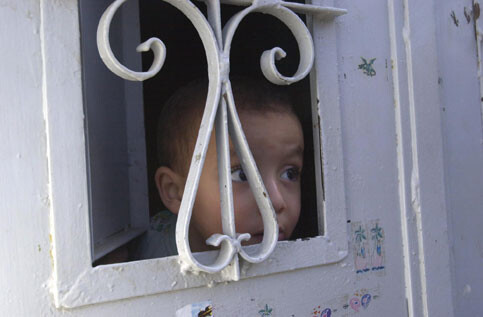Amnesty International 27 November 2003

Palestinian child in Nablus looking outside the window of the door of his home (Photo: Nasser Ishtayeh)
Every Palestinian living in the Occupied Territories has suffered under the severe movement restrictions imposed by the Israeli army in the past three years. The impact on children has, however, been particularly severe.
Closures and curfews have prevented children from attending classes for prolonged periods, with inevitable consequences for their education and future personal and professional development prospects. With more than half the Palestinian population now living below the poverty line, there is also growing evidence of malnutrition in young children. And as impoverished families seek all possible means of adding to household income, child labour is reported to have increased.
Movement restrictions also prevent access to healthcare. As a result of stringently enforced closures and blockades, several women, on their way to hospital to give birth, have been forced to give birth at checkpoints, on the road, or at home. At least 10 babies have died as a result.
No Palestinian living in the Occupied Territories has escaped the impact of the severe movement restrictions imposed by the Israeli army since the start of the intifada three years ago. The impact on their right to work and to an adequate standard of living, education and healthcare has been devastating and widespread. Unemployment has soared to close to 50%, and loss of income from work has in turn caused a steep rise in poverty, the emergence of malnutrition and an increase in other illnesses. A World Bank report issued in May 2003 estimates that about 60% of the Palestinian population is living below the poverty line of US$2.1 per day and that real per capita food consumption has dropped by up to 30% in the past three years.
Israel has the right to take reasonable, necessary and proportionate measures to protect the security of its citizens and its borders from attacks by Palestinian armed groups, including by restricting access to its territory. However it does not have the right to impose arbitrary, discriminatory or collective measures and punishment on the Palestinian population.
As an occupying power, Israel has an obligation under international law to ensure freedom of movement, an adequate standard of living, and as normal a life as possible to the population in the Occupied Territories. The sweeping restrictions imposed by Israel violate these obligations, and in many cases constitute collective punishment.
Hundreds of thousands of Palestinians cannot be made to pay for the crimes of a handful of individuals. Any restrictions on the movement of people and goods should be imposed only in relation to a specific security threat and if they are non-discriminatory, necessary and proportionate in scope and duration.
According to the UN Special Rapporteur on the right to food some 3.5 million Palestinians are facing a catastrophic humanitarian situation. After a visit to the area, he stated that the right to food in the Occupied Territories had been seriously violated, with a number of households suffering from chronic malnutrition. He blamed the economic breakdown in the West Bank and Gaza Strip on Israel’s closing off of the Occupied Territories.
In a recent report, the Special Rapporteur on the situation of human rights in the Palestinian territories has likewise affirmed that the restrictions on freedom of movement create a humanitarian crisis in the Occupied Territories. Curfews and checkpoints have led to restraints on the movement of goods and persons which give rise to unemployment, poverty, poor health care and interrupted education.
A report by Save the Children UK issued in April 2003, Growing up under Curfew: Safeguarding the basic rights of Palestinian children, demonstrated how the lives of Palestinian children are tense and dominated by the political violence that surrounds them. They are frightened, resigned, anxious, uncertain and demoralised. Their rights to and in education are increasingly unfulfilled: schools have been closed and teaching days lost, the quality of education is declining, and children’s academic achievements are suffering. Furthermore, financial, physical and psychological barriers are preventing access to health services and parents are prioritising only essential health care for their children.